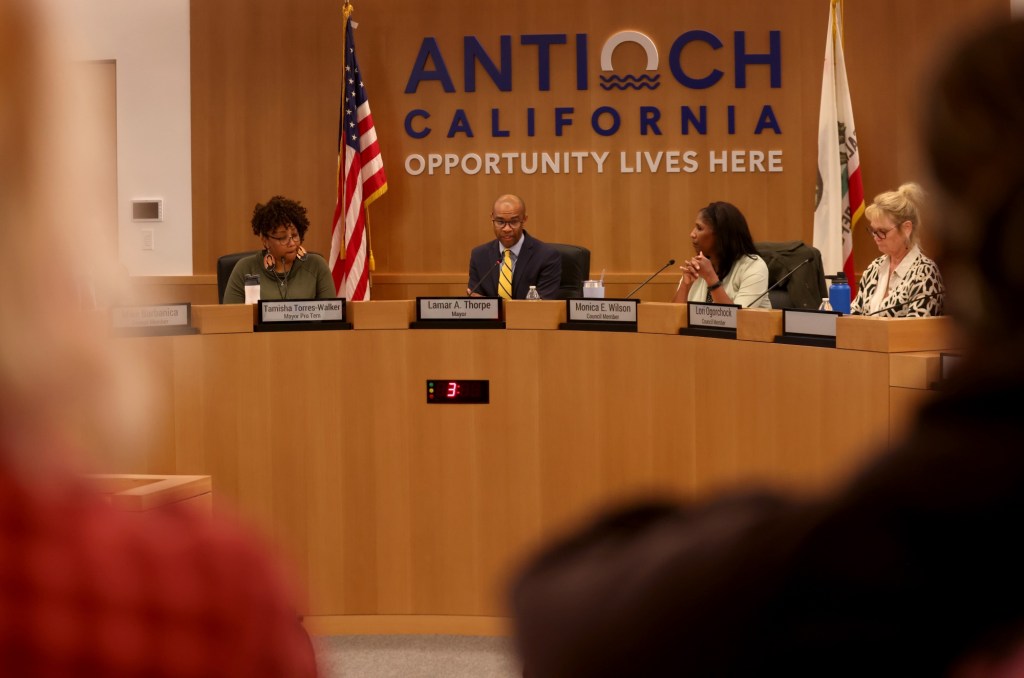MARTINEZ — It’s undisputed that three members of the Antioch City Council privately convened at least twice without alerting or inviting the public.
What remains unclear is whether any official government business was discussed during these secret meetings in 2021 and 2022, and if subsequent conversations aligned the elected leaders’ decisions on hirings, internal operations or electoral map redistricting.
Last year, public corruption watchdogs in Contra Costa County were tipped off about potentially private talks between Antioch Mayor Lamar Hernandez-Thorpe and councilmembers Tamisha Torres-Walker and Monica Wilson — allegations that, if true, would be blatant violations of California’s open meetings law. The meetings allegedly centered around the hiring of now-former City Manager Cornelius Johnson, restructuring the public works department, hiring a city engineer and redrawing city council districts.
But two independent investigations led by the Contra Costa District Attorney and county Civil Grand Jury this year could not prove beyond a reasonable doubt that city leaders flouted state law.
“The Grand Jury found evidence that the meetings cited by the District Attorney took place … (but) the Grand Jury was unable to independently confirm the contents of those meetings,” the 19-page grand jury report released Tuesday said.
Despite interviews with multiple unnamed witnesses and local government experts, the report said there was insufficient evidence to validate claims of intentionally illicit behavior. But both county prosecutors and volunteer grand jurors agreed that the possibility that Hernandez-Thorpe, Torres-Walker and Wilson discussed city business behind closed doors is enough to stoke “serious concerns” that the three Antioch officials did not fully comply with the Brown Act.
The grand jury’s report doubled down on a January letter signed by Contra Costa District Attorney Diana Becton, which underscored the importance of adhering to the state’s public meetings law — even barring any specific charges of wrongdoing.
Signed in 1953, the Brown Act was designed to ensure that government business was handled in public and without undue influence. It provides a blueprint for how local government officials should conduct themselves. One of the key provisions is that a majority of an elected government body cannot meet to arrange a vote in private. But for it to amount to a criminal misdemeanor, there must be sufficient evidence a private meeting was held, city business was discussed and a collective action was taken with the intent to deprive the public of information.
“Any similar meeting on matters concerning the city could subject council members to criminal liability,” read the DA’s letter, addressed to Antioch Acting City Manager Kwame Reed. “As the Brown Act makes clear, the deliberations and actions of our government representatives must occur openly and be subject to public scrutiny.”
Reached by phone Wednesday, Hernandez-Thorpe said that “the (grand jury) report speaks for itself,” regardless of how anyone “tries to use this as an opportunity to play politics.”
“Myself and councilmembers Torres-Walker and Wilson were elected as progressive Democrats,” Hernandez-Thorpe said. “We tend to think alike, we tend to agree on a lot of things and we don’t need to have secret meetings to understand what we believe.”
He added, “these investigations continue to demonstrate that we haven’t done anything.”
But David Snyder, executive director of the First Amendment Coalition, disagreed that the DA and grand jury’s work was for naught. Even without a “slam dunk conclusion” about the behavior of the Antioch councilmembers, he said the subsequent inquiries are enough to damage public trust in elected leaders and the fundamental tenets of democracy.
“There is a public service in just bringing these facts to light,” Snyder said, adding that secret meetings are, by design, difficult to prove. “It helps put public agencies on notice that they’re being watched and that they are accountable to and must follow these open government laws.”
Shortly after the grand jury’s report was published, Antioch Councilmember Mike Barbanica urged Hernandez-Thorpe, Torres-Walker and Wilson to “do the right thing” and step down from office.
Barbanica, who is currently campaigning for Contra Costa County’s District 5 supervisor seat, said that the evidence supporting claims about secret meetings was enough to damage city operations.
“This is not the way cities are supposed to operate — this is supposed to be open to the public, fair, transparent,” Barbanica said in a YouTube video Tuesday. “I am urging the District Attorney Diana Becton to reopen a criminal investigation and investigate this to the fullest extent of the law.”
Staff writer Nate Gartrell contributed to this report.
